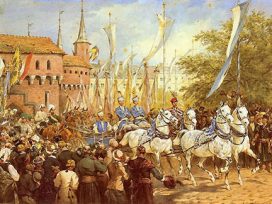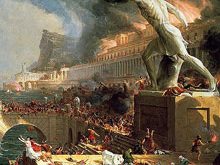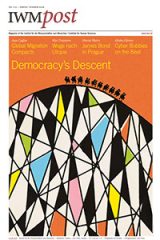

In collaboration with
Institute for Human Sciences
The Institute for Human Sciences / Institut für die Wissenschaften vom Menschen (IWM) is an independent institute for advanced study in the humanities and social sciences. Since its foundation in 1982, it has hosted more than 1500 scholars, journalists and translators from all over the world. Many of the Institute’s Permanent and Visiting Fellows are regular contributors to Eurozine or its focal points The World in Pieces and Ukraine in European Dialogue (see below).
Website: www.iwm.at
X (formerly known as Twitter): https://x.com/iwm_vienna
Youtube: https://www.youtube.com/channel/UCIwFQ_iRX8w8D0NKJo41Ihw

Articles

The threat that the EU now faces is as deadly as the one that confronted the Habsburg Monarchy a hundred years ago, writes British diplomat Robert Cooper, one of the intellectual architects of EU foreign policy. But getting it right does not need a miracle.

The European dis-Union
Lessons from the Soviet collapse
Too big to fail? Too crisis-hardened to go under? The collapse of the Soviet Union has something to teach Europe’s politicians if another leap from the unthinkable to the inevitable is to be avoided in the case of the EU, argues Ivan Krastev.
Land of confusion
Ukraine, the EU and the Tymoshenko case
The Ukraine-European Union summit, originally planned for 19 December, was to have brought talks on an Association Agreement between Ukraine and the EU to a conclusion. However the conflict over the prosecution of Yuliya Tymoshenko has endangered the process, raising serious doubts about the European aspirations of the current Ukrainian leadership. The country’s future hangs in the balance, writes Tatiana Zhurzhenko.
The challenge for a liberal democracy is to remain as such, argues Charles Taylor in conversation with Slawomir Sierakowski. Western democracies suffer two types deterioration: a misperception of really existing problems and a lack of vital tension between the demos and the government.
Focal points

Inspired by a lecture that Clifford Geertz delivered in 1995 at the Institute for Human Sciences in Vienna, this focal point engages with ‘deep diversity’, ‘a sense of dispersion, of particularity, of complexity and of uncenteredness’ rather than unified world order. It follows the launch of a research programme of the same name at the institute in January 2023.

Post-revolutionary Ukrainian society displays a unique mix of hope, enthusiasm, social creativity, collective trauma of war, radicalism and disillusionment. With the Maidan becoming history, the focal point ‘Ukraine in European Dialogue’ explores the new challenges facing the young democracy, its place in Europe, and the lessons it might offer for the future of the European project.
Projects and publications

